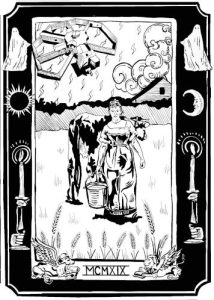
The Trials of Maggie Pollock At The Blyth Festival
In it’s fifty years of telling stories of Huron County and other rural Canadian communities, the Blyth Festival has told a fair number of tall (and true) tales, but surely none so outlandish as the one spun in Beverley Cooper’s The Trials of Maggie Pollock.
Maggie Pollock held the distinction of being the last woman in Canada to be tried for witchcraft, not in 1692 like those unfortunate women in Salem, Massachusetts, but in 1919.
Maggie, it seems, was what today we would call, without too much opprobrium, a clairvoyant or psychic. What set her apart and caused her no end of trouble was that her second sight came in the form of visits from the spirit world. Long before M. Night Shyamalan’s “The Sixth Sense,” Maggie Pollock was seeing dead people.
Maggie Pollock discovered her “gift” early in life and from the beginning she paid a price. When her fiancé found that rumours of her talking to the dead were true, the marriage was broken off and she became a spinster, leading a hardscrabble life with her brother on a Huron County farm.
Her abilities became widely known and local folk sought out her assistance. She apparently never promised results although she had some singular successes, asking only a small “gratuity” for her time.
Things started going awry for Maggie when an overzealous local constable, egged on by people who bore a grudge, charged her under an ancient but still extant law with witchcraft, or to be more precise that she “did pretend to use a certain kind of witchcraft, sorcery, enchantment or conjuration.”
Cooper tells the story of Maggie Pollock with admirable efficiency using a cast of just five actors. Caroline Gillis portrays Maggie but myriad other characters are played by the other four, Amy Keating, Cameron Laurie, J.D. Nicholson, and Susan Stackhouse. All of them assume a disparate array of characters, often in rapid succession, and do so with aplomb.
As far as I can tell, The Trials of Maggie Pollock stays pretty true to the historical record, although I’m guessing that the ghosts of a victim of the Salem witch trials (Stackhouse) and a near contemporary, but dead, celebrity spiritualist (Keating) who hang out with Maggie from time to time during the course of the play are an understandable authorial device.
As Maggie Pollock, Gillis carries the weight of the play and she turns in her usual rock-solid performance. Nicholson distinguishes himself as a number of lawmen and judges. A scene in which he, Keating, and Stackhouse portray the judges of the Court of Appeals in Ottawa debating the merits of Maggie’s case is a comedic highlight.
Director Ann-Marie Kerr and her creative team serve up a textbook example of what might be called the Blyth Festival’s “house style.” The tale is told simply on a bare-bones stage, with actors moving set pieces and changing costumes in full sight of the audience. Brecht-like announcements guide us through the time line of events and ample opportunity is given for the audience to exercise its own imagination. Along the way Kerr gives us some genuinely spooky moments.
Shawn Kerwin has created a malleable set in which the shelves of Maggie’s kitchen, artfully composed still lives themselves, become the walls of various courthouses. Gauze curtains at the sides billow to conjure the thin veil that separates the living from the dead.
The lighting by Beth Kates does a masterful job of highlighting the action as it moves about the stage and I admired the way in which hidden lights held in a cupped hand illuminated the faces of those from the spirit world.
Jennifer Triemstra-Johnston has provided costumes that span a wide variety of times and places and Heidi Chan’s original music and sound design are eerily effective.
Cooper makes a case for the root cause of the centuries-long persecution of women as witches by pinning it on the patriarchy. A pretty fair charge, no doubt, but here it is more a matter of tell rather than show.
The internal evidence of The Trials of Maggie Pollock is that the hobgoblin that afflicted Maggie Pollock was the foolish consistency of small minds following the letter of an absurd law dating from a less enlightened time.
What Cooper and Kerr have succeeded quite admirably in doing is telling yet another compelling story about Huron County history. The audience with which I saw the show was quite obviously enthralled and responded with a standing ovation.
The Trials of Maggie Pollock continues at the Blyth Festival through August 29, 2024. For more information and to purchase tickets, visit the Blyth Festival website.
[image: Autumn Ducharme, courtesy Blyth Festival]
For a complete index of reviews CLICK HERE.
Don’t miss another review or blog post! SUBSCRIBE HERE.

